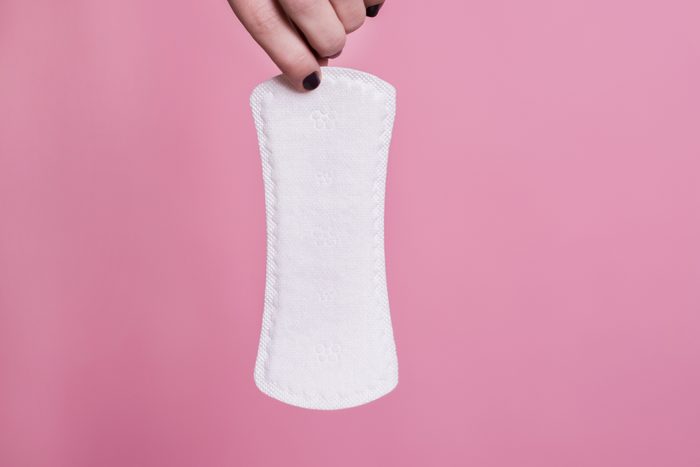
Insights from your first period
Getting your period for the first time is an important part of puberty. Even if that day came and went a while ago, it could still tell you a lot about your health now. Here are the health issues that doctors and researchers have found are linked to your first period.
Get The Healthy @Reader’s Digest newsletter
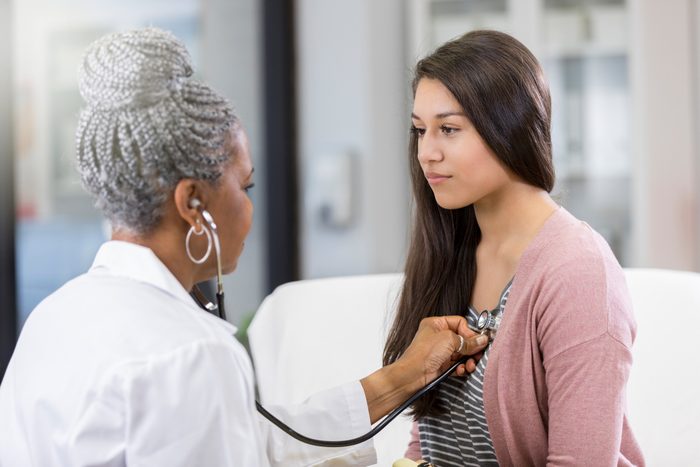
Your first period could predict your risk of heart disease
Heads up if your first period came super early (before the age of 10) or a little late (after 17). Scientists have found that women who first started menstruating way outside the normal age range may be at a higher risk for heart disease, stroke and high blood pressure compared with women who got their first period at age 13, who had a lower risk. “The age of menarche has been shown to be associated with a lot of things related to woman’s health—particularly early menarche, with an increased risk for cardiovascular disease,” says Martha Gulati, MD, professor of medicine and division chief of cardiology at the University of Arizona-Phoenix. The reason for the link is unclear, and experts warn that the findings are not definitive.

Your first period may influence your weight
Or, the scale may influence when you get your period. Research has shown that getting your period before age 12 has been associated with increased body fat in early adulthood and obesity later in life. But, kind of like “the chicken or the egg” dilemma, it’s tough to say which came first. “Earlier menarche is likely associated with higher body mass index,” explains Mary Pat Gallagher, MD, pediatric endocrinologist and assistant professor in the department of pediatrics at NYU Langone. (Body mass index—BMI—is a combination of a person’s height and weight.) This is a concern, she says: “An elevated BMI in childhood correlates to an elevated BMI in adulthood.”
11 Sneaky Reasons Behind a Missed Period (Besides Pregnancy)
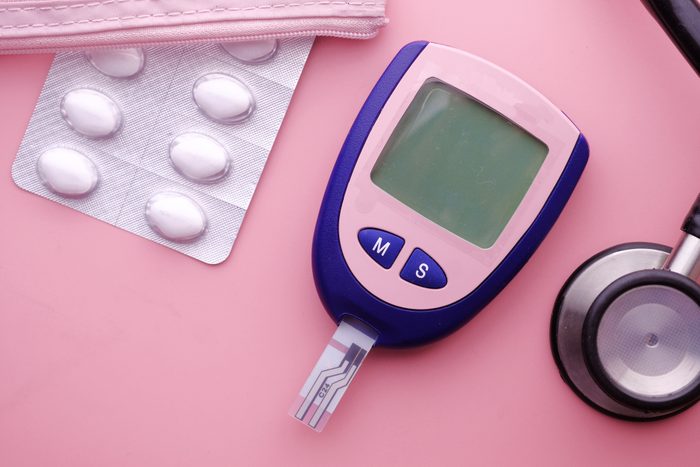
Your first period may predict your risk of type 2 diabetes
In a 2019 study of more than 15,000 women, scientists found that those who got their period between ages eight and 11 had a 70% higher incidence of type 2 diabetes compared to those who started menstruating at age 13. Obesity could be part of the link—research shows menarche at a younger age is associated with higher BMI in later life, and elevated BMI itself is a major risk factor for type 2 diabetes, according to the study authors.
An increase in insulin resistance may factor in as well. Hormonal changes at the onset of puberty have been linked to a benign increase in insulin resistance, explains Dr. Gallagher, who also serves as director of the Robert I. Grossman, MD and Elisabeth J. Cohen, MD Pediatric Diabetes Center at Hassenfeld Children’s Hospital of New York at NYU Langone. “Earlier exposure to the hormones of puberty could be responsible for a persistent change in insulin sensitivity that permanently changes the risk for type 2 diabetes later in life,” Dr. Gallagher says.
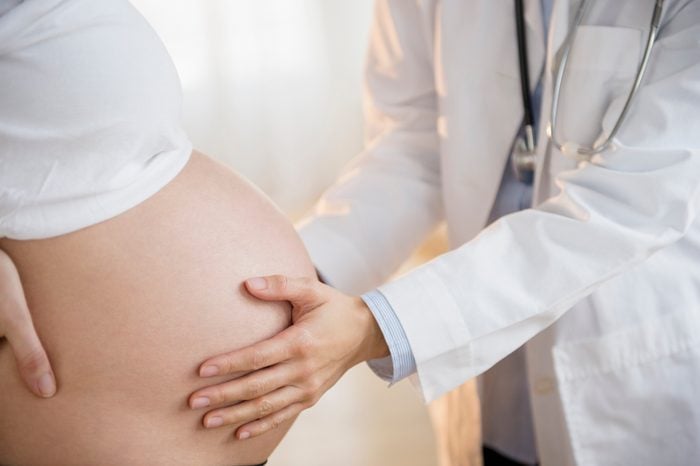
Your first period may predict the health of your pregnancies
Preeclampsia is a serious pregnancy complication characterized by high blood pressure and signs of damage to other organs, often the kidneys. If left untreated, it can be life-threatening for you and your baby. Research in the ISRN Obstetrics and Gynecology found that women who get their period at age 10 or younger are three times more likely to develop preeclampsia compared to those who got their first period at age 13. If you’re obese and got your first period before age 11, your risk is even higher.
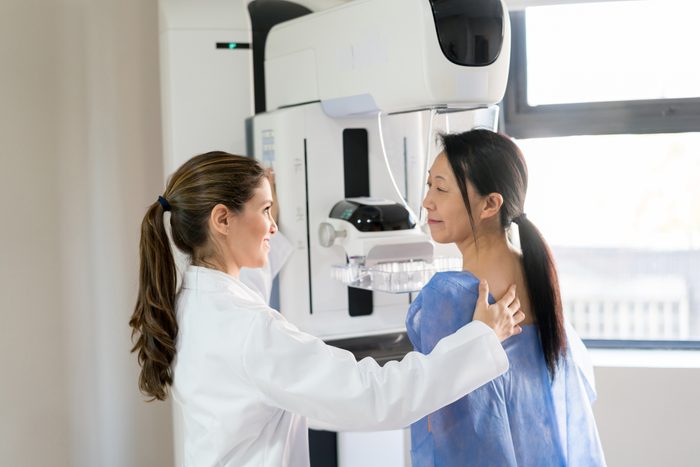
Your first period could affect your breast cancer risk
There’s growing evidence that the longer you have your period, the higher your breast cancer risk. Women who start their menstrual period before age 12 have about a 20% higher risk of breast cancer compared to those who begin after age 14, research shows. Other research shows that hitting menopause at a later age—say, after 55—may increase your breast cancer risk by 30%, versus women who reach menopause before age 45. In a third study, scientists at the University of Oxford found that a longer menstrual life—earlier periods and later menopause—are linked to specific types of breast cancer: estrogen-sensitive and lobular tumors. The findings suggest the more estrogen and sex hormones your body produces over your life span, the more likely your chances of developing breast cancers that are hormone-sensitive.
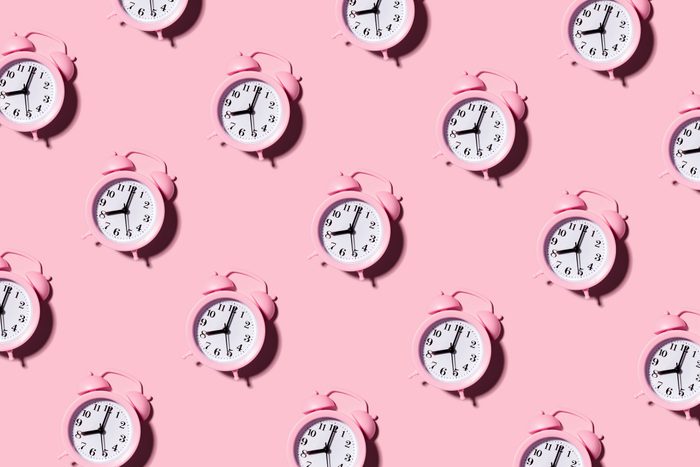
Your first period doesn’t predict age of menopause
The average age at which a girl in the United States gets her first period is 12. The good news: Just because you got your period later doesn’t mean you’ll also enter menopause later. And just because you got your period earlier doesn’t mean you’ll hit menopause sooner. Most women get their last period at around age 51. Genetics, smoking and other factors may influence the timing of your transition to menopause.
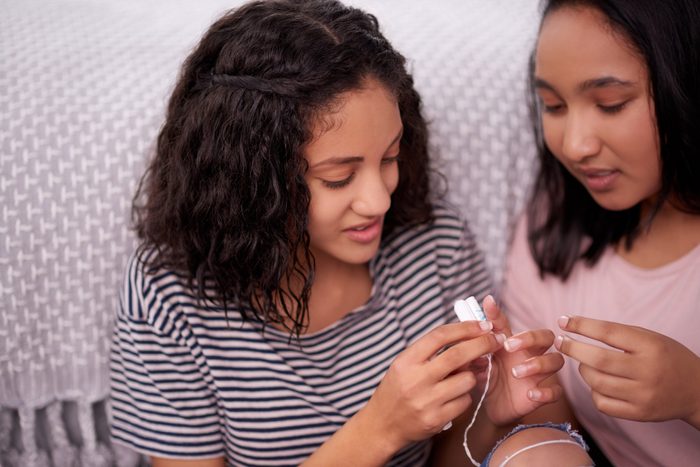
Your first period may predict how long you live
Women whose periods begin later and who experience menopause later in life are more likely to live to be 90, suggests a study from the University of California-San Diego School of Medicine published in the journal Menopause. Researchers found that women who started menstruation after age 12 were less likely to have certain health issues, such as coronary heart disease or diabetes, and those who experienced menopause after 50 were more likely to be in excellent health overall.
For more wellness updates, follow The Healthy on Facebook, Instagram, and Twitter. Keep reading: